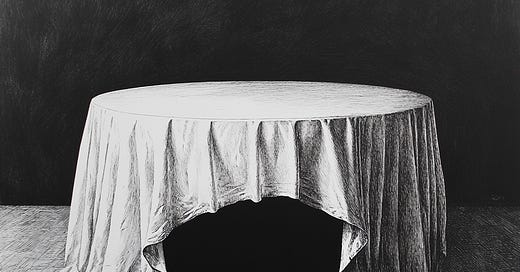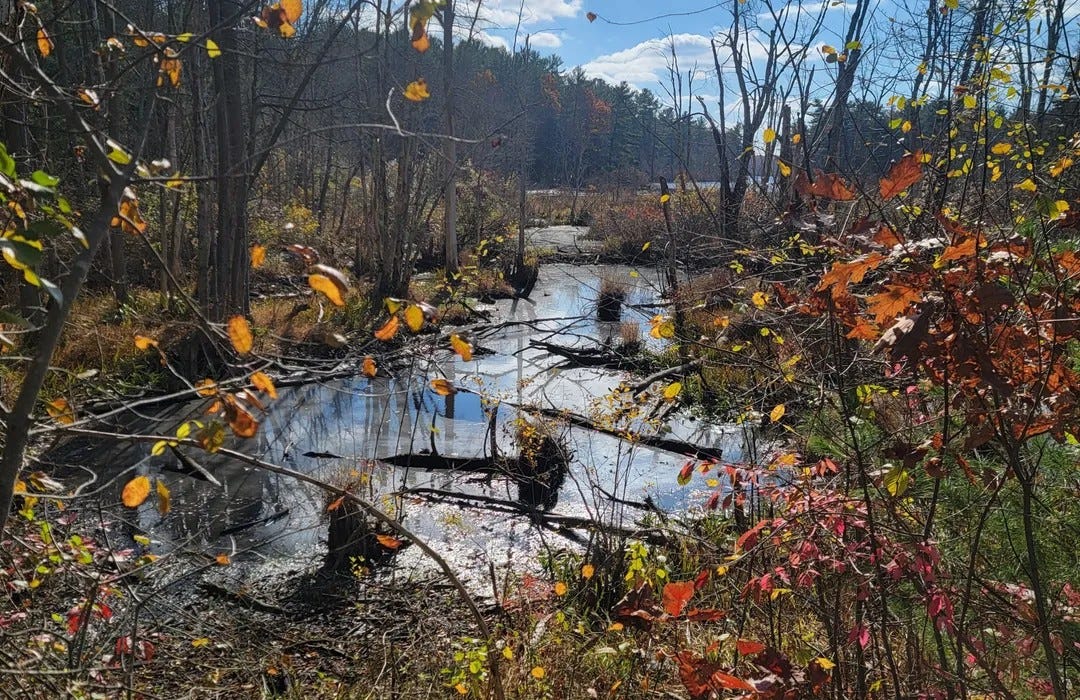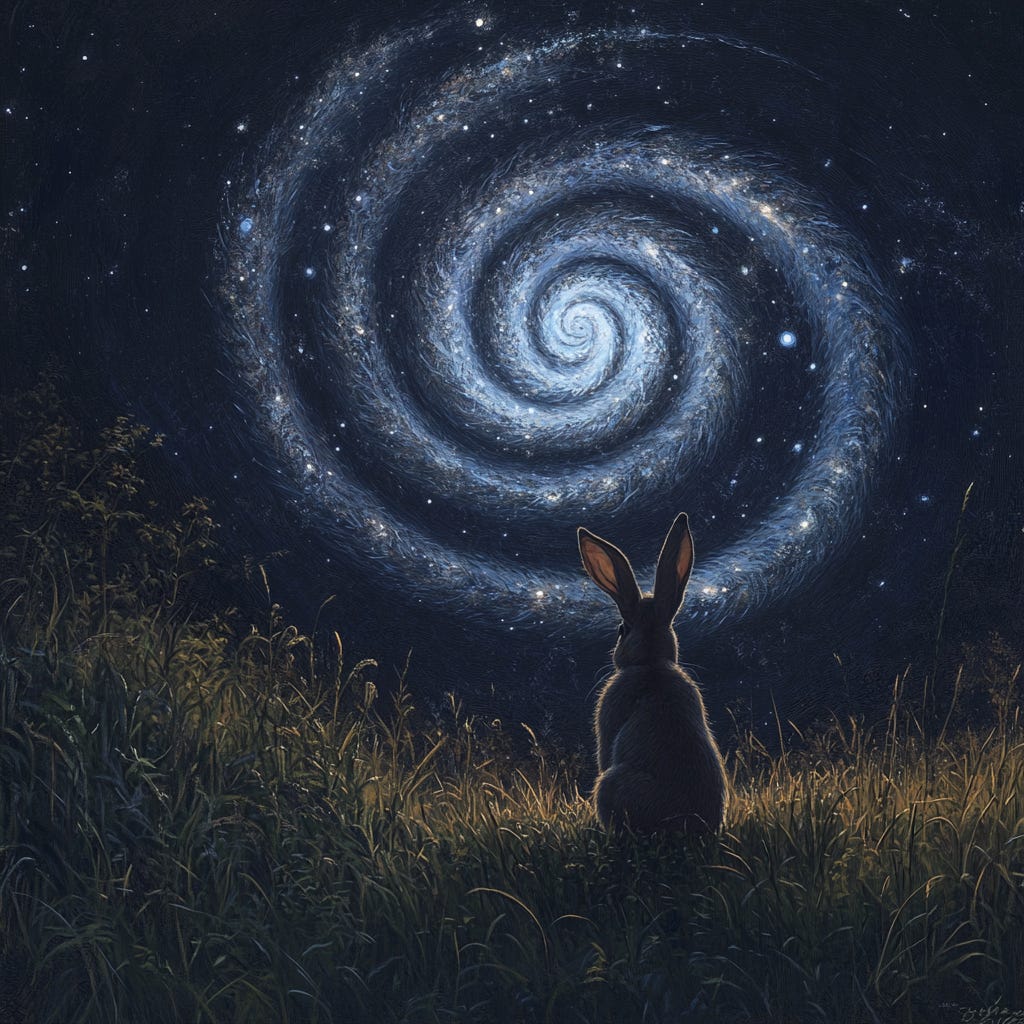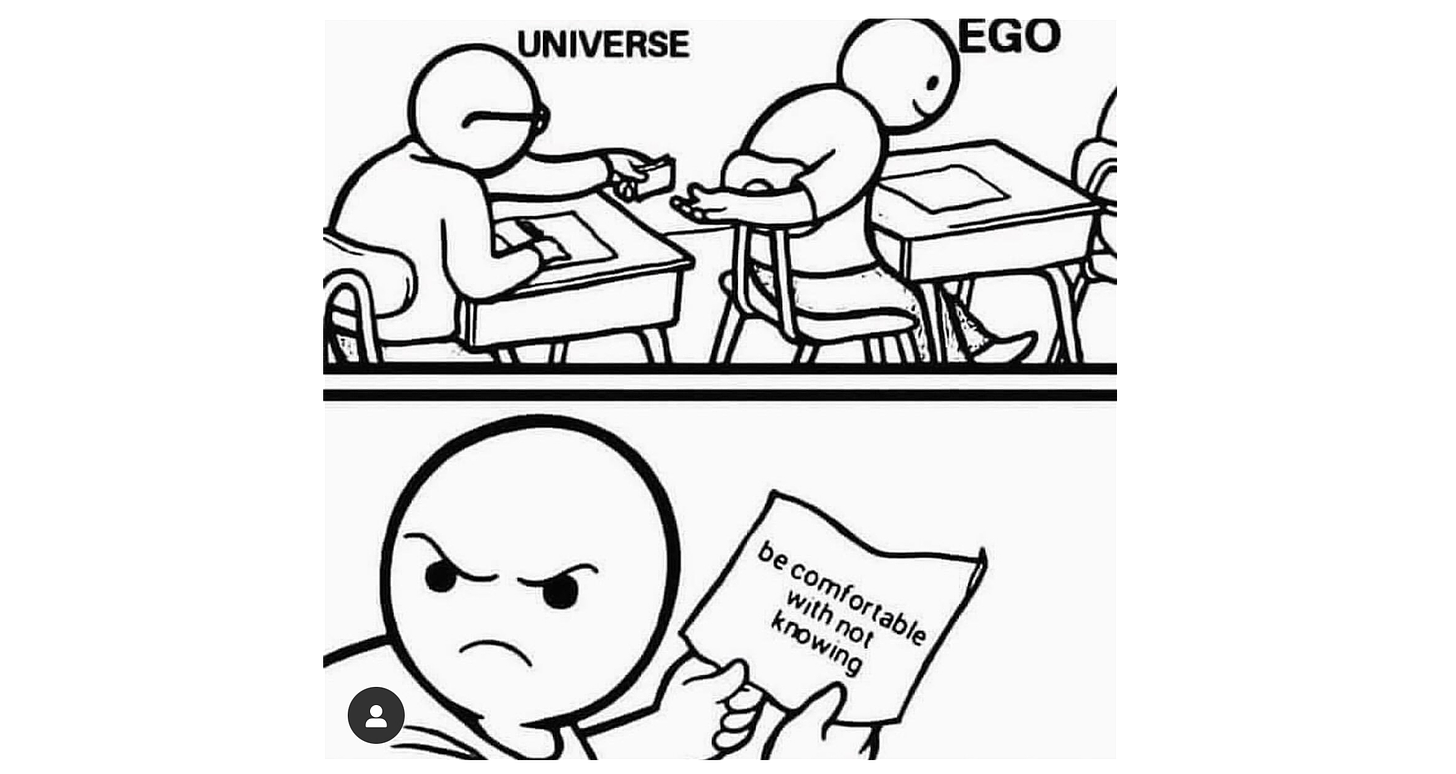My Greatest Fear (Wrestling with Faith and Fate)
"If you look for truth, you may find comfort in the end: if you look for comfort you will not get either comfort or truth - only wishful thinking and despair.” - C.S. Lewis
This has been a difficult piece to write. Everything has been for the past few months. It was all stuckness and straining, fighting and grinding, no flow and no ease. I can finish this now, I think, because I feel some light. Faith has returned.
Back in October, I spent a weekend solving puzzles and fighting with foam swords in the forest of Connecticut (role-play that was not a LARP but kind of LARP-y). On the second day, we sat in a clearing with a group of elders when one of them asked: “What is your greatest fear?”
That hit me like a train. I felt an electric shiver across the back of my skull, my signal to be still and listen to my intuition. If I could let myself relax, if I could drop the urge to look smart in front of everyone, there would be space for a deeper truth to emerge. I focused on my breath while the question made its way around the circle.
“My greatest fear is that I don’t do what I am here to do,” I heard myself say. Surprise.
I used to think very differently about life.
There seemed to be nothing “to do” in the sense of destiny or purpose. We are born, we do things, we die. We’re here to have children, amuse ourselves, and suffer. Humanity, as Rust Cohle put it, looked like a tragically self-aware species trapped in a “giant gutter in outer space.” The point of life then, I reasoned with my college roommate on a drunk night, must be to experience more pleasure than pain. But those were hollow words stitched together like a tablecloth to cover my deep unease.
Some six years ago, my then-girlfriend accidentally exposed the void underneath the cover. “How would you feel if you died tomorrow?” she asked.
“I think I’d be okay with it,” she said. I understood why. That woman was a badass. She had escaped the bonds of a strict religious community and arranged marriage, moved to another country, and was building two businesses. Her life was neither easy nor perfect, but she was the main character of her story.
I on the other hand felt paralyzed by the question, like a rabbit staring at a snake. I had reached my early thirties, but it felt as if my real life had not even begun. If life was like going to the movies, I was still watching trailers. I was moving from job to job (and, if I’m being honest, from relationship to relationship) looking for an answer to the gravitational pull of inner emptiness.
Søren Kierkegaard called this ‘unconscious despair’, the despair of a self unaware of its spiritual nature. But spirituality meant nothing to me and neither did Kierkegaard. All I knew was that I had no answers and didn’t know what questions to ask. Then I stumbled right into it.
During COVID, I bumped into a muse, the living embodiment of my secret creative yearning (and a future tragicomic love story). In our brief time together, she opened a tiny crack in the door to the other realm. And once you know there even is a door, it’s hard not to keep going.
In the last few years, I went deeper — with psychedelics, meditation, sound, breathwork, and other practices. I cried, shook, roared, and floated in blissful silence. The deepest moments were selfless and timeless, yet also deeply alive. I felt centered and in harmony, congruent as if all shapes of me had collapsed into one. I had been worried about being swallowed by the void, but now I fell into it, through it, beyond it. I realized the void was just as much ‘home’ as the rest of my life.
One night, I took off my mask to the sound of distant rain and singing bowls and bumped into something. It took me a while to realize that I returned as a believer.
At first, it felt like an intrusion, an embarrassment even. I couldn’t explain what had happened or what I believed. Everything felt beyond the reach of words. But sometimes, especially around trees and water, I could still feel the subtle tapestry connecting me with all things. If God is real, what do they want, I asked a friend.
“Things are more integrated than they seem, they are better than they seem, and they are more mysterious than they seem,” Huston Smith wrote about the shared ideas across religious traditions in The World’s Religions. That matched my experience. The world had become more mysterious, more alive, and more connected.
But as the world took on a gentle holy glow, my life came unglued. Everything felt misaligned and out of place. I fell out of life. The city seemed absurdly noisy, and I became sensitive to people’s moods in ways I had never experienced. I spent even more time alone, pondering and wandering.
Work was bad. Ideas that had interested me died in my hands. The only thing holding my fascination seemed to be the inner journey. I had blown the doors of perception wide open and walked right into a dark night of the soul.
Also, my fear changed shape. Gone was the despair over a meaningless universe. But what if, I wondered, what if I have a fate but fail to meet it? This fear felt a lot more intense. “The more consciousness, the more the despair,” as Kierkegaard put it.
I obsessed over time. Had I discovered the secret of life too late? “I wasted time, and now doth time waste me,” Shakespeare’s deposed King Richard II laments his fate. I rushed from one experience to the next, desperate for more knowledge and guidance, determined to catch up. I jumped into the void until I destabilized myself enough, I couldn’t tell a bad dream from a vision or ‘visitation.’ I was stumbling through a newly fluid and porous reality.
When I stopped chasing experiences, I was left with a pile of clues but no map, no further guidance, no comforting visions. What if I never found my path South? What if I forgot my precious fragments of truth and fell back asleep? What if I lost myself in the maze of entertaining distractions? The trailers were over, the movie was running — and I still could not figure out what role I was supposed to play?
The many faces of fear converged into one: a fear of failing to act, of remaining still like the rabbit. My greatest fear was falling prey to fear itself.
Kierkegaard’s The Sickness unto Death is a tough read and I am grateful that David Milch guided me to its key idea. The answer to despair, Kierkegaard wrote, was for the self to rest in faith, to “rest transparently in the power that established it.” To rest — not to strain or complain, not to argue, fight, and gripe.
This echoed my deepest experiences, moments of stillness, timelessness, and selflessness. But I found it almost impossible to follow.
Resting in faith means dropping all expectations, all ideas of what life should be like. It’s a goodbye to old desires and designs, a kind of tiny death. I don’t know how things are supposed to unfold. Thy will be done.
I anchor my days with meditation and prayer. I wait for a glimpse of timeless connection and wholeness. I express gratitude and ask for guidance. “I don’t know how things are supposed to unfold.” All I get is this moment and the choice of how I show up.
I try to listen, to be present, to share, to be of service. When I struggle to get it right, as inevitably happens, I hope for another chance to do better.
“Man can neither make, nor retain, one moment of time,” C.S. Lewis wrote in The Screwtape Letters, “it all comes to him by pure gift.”
Every day is a chance — the only chance — to receive and share the gift.
Every day offers a chance to experience that “our sense of separateness in every fundamental way is an illusion” as David Milch put it.
Every day presents a choice of acting from a place of fear or faith, of letting the mind create a world of despair or glory.
“The human opportunity, the religions tell us,” Smith wrote, “is to transform our flashes of insight into abiding light.” Once life turns from a meaningless slog into a mysterious (and miraculous) journey of utmost importance, the real work begins.
Destiny is not a place to reach but a path to walk. Destiny is a direction, not a destination.
— Frederik
👉If you would like to receive my work regularly:
👉 If you enjoy reading this post, feel free to share it with friends or click the ❤️ button so more people can discover it on Substack 🙏
A better question to reflect on.
Instead of “How would you feel if you died tomorrow?” ask yourself: “What would I do if I had two to five years left?”
Pick a time frame long enough to do something difficult, ambitious, and meaningful, but too short to avoid making a choice. No multi-tasking. What one thing would you focus on?
If you could leave the world with one more meaningful contribution, what would be the scariest thing to attempt?
Related:








Thank you for this Frederick. Much love.
You r at the stage where you can see that any fear about Self doing or not doing , achieving or not achieving blabla is blocking permanent state of God connection. Play with puppies, have babies , doodle…simple shit is the way out of the intellectual bubble of ‘ I need to produce Art, be smart, achieve my souls life goals, enlightenment etc etc ..endless rollercoaster of ego re-creation. Wu Wei to all that and catch self obsessing about self .. giving up the ‘search’ is a way through you know ..